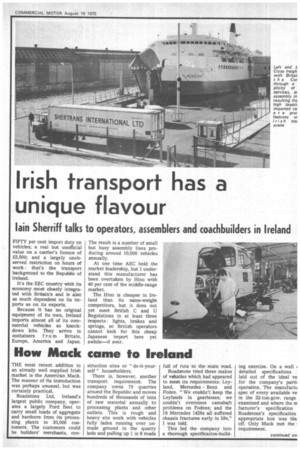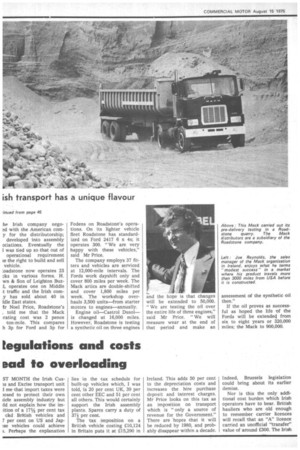How Mack came to Ireland
Page 47

Page 48

If you've noticed an error in this article please click here to report it so we can fix it.
THE most recent addition to an already well supplied Irish market is the American Mack. The manner of its introduction was perhaps unusual, but was certainly practical.
Roadstone Ltd, Ireland's largest public company, operates a largely Ford fleet to carry small loads of aggregate and hardcore from its processing plants to 30,000 customers. The customers could be builders' merchants, con struction sites or " do-it-yourself " householders.
There is, however, another transport requirement. The company owns 70 quarries around the Republic and moves hundreds of thousands of tons of raw material annually to processing plants and other outlets. This is rough and heavy site work with vehicles fully laden running over unmade ground in the quarry hole and pulling up 1 in 6 roads full of ruts to the main road.
Roadstone tried three makes of vehicles which had appeared to meet its requirements: Leyland, Mercedes Benz and Foden. " We couldn't keep the Leytands in gearboxes; we couldn't overcome camshaft problems on Fodens; and the 18 Mercedes 1428s all suffered chassis fractures early in life," I was told.
This led the company into a thorough specification-build ing exercise. On a wall detailed specifications laid out of the ideal ve for the company's parti, operation. The manufactu spec of every available ye in the 32-ton-gcw. range examined and where the rn facturer's specification Roadstone's specification appropriate box was bla off. Only Mack met the requirement. he Irish company negoad with the American corny for the distributorship; developed into assembly otiations. Eventually the l was tied up so that out of operational requirement le the right to build and sell vehicle.
;oadstone now operates 23 2.ks in various forms. H. wn & Son of Leighton BuzI, operates one on Middle t traffic and the Irish corny has sold about 40 in Idle East states.
1r Noel Price, Roadstone's , told me that the Mack rating cost was 2 pence ton-mile. This compares Ii 3p for Ford and 5p for Fodens on Roadstone's operations. On its lighter vehicle fleet Roadstone has standardized on Ford 2417 6 x 4s; it operates 300. "We are very happy with these vehicles," said Mr Price.
The company employs 37 fitters and vehicles are serviced at 12,000-mile intervals. The Fords work dayshift only and cover 800 miles per week. The Mack artics are double-shifted and cover 1,800 miles per week. The workshop overhauls 3,500 units—from starter motors to engines—annually.
Engine oil—Castrol Dusolis changed at 16,000 miles. However, Roadstone is testing a synthetic oil on three engines and the hope is that changes will be extended to 50,000. "We are testing the oil over the entire life of three engines," said Mr Price. "We will measure wear at the end of that period and make an assessment of the synthetic oil then."
If the oil proves as successful as hoped the life of the Fords will be extendeg from six to eight years or 320,000 miles; the Mack to 900,000.




































































































